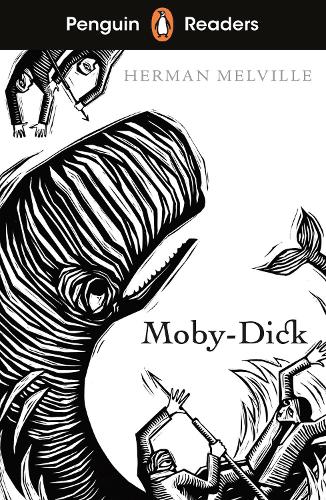
Penguin Readers Level 7: Moby Dick (ELT Graded Reader)
(Paperback, Abridged edition)
Publishing Details
Penguin Readers Level 7: Moby Dick (ELT Graded Reader)
By (Author) Herman Melville
Penguin Random House Children's UK
Penguin Books Ltd
5th January 2021
5th November 2020
Abridged edition
United Kingdom
Classifications
General
Non Fiction
Childrens / Teenage fiction: Classic fiction
428.64
Physical Properties
Paperback
112
Width 129mm, Height 198mm, Spine 8mm
103g
Description
Penguin Readers is a graded reading series for English Language Teaching (ELT) markets, designed for teenagers and young adults learning English as a foreign or second language. With carefully adapted text, new illustrations, language practise activities and additional online resources, the Penguin Readers series introduces language learners to bestselling authors and compelling content. Titles include popular classics, exciting contemporary fiction, and thought-provoking non-fiction. Moby Dick, a Level 7 Reader, is B2 in the CEFR framework. The longer text is made up of sentences with up to four clauses, introducing future perfect simple, mixed conditionals, past perfect continuous, mixed conditionals, more complex passive forms and modals for deduction in the past. When the young sailor "Ishmael" decides to sail on the Pequod with the mysterious Captain Ahab, he has no idea about Ahab's plans to get revenge on the great white whale Moby Dick. Ahab wants to find and kill the whale at any cost - even if it means losing his ship and his crew.
Author Bio
Herman Melville (1819-91) became in his late twenties a highly successful author of exotic novels based on his experiences as a sailor - writing in quick succession Typee, Omoo, Redburn and White-Jacket. However, his masterpiece Moby-Dick was met with incomprehension and the other later works which are now the basis of his reputation, such as Bartleby, the Scrivener and The Confidence-Man, were failures. Melville stopped writing fiction and the rest of his long life was spent first as a lecturer and then, for nineteen years, as a customs official in New York City. He was also the author of the immensely long poem Clarel, which was similarly dismissed. At the end of his life he wrote Billy Budd, Sailor which was published posthumously in 1924.
